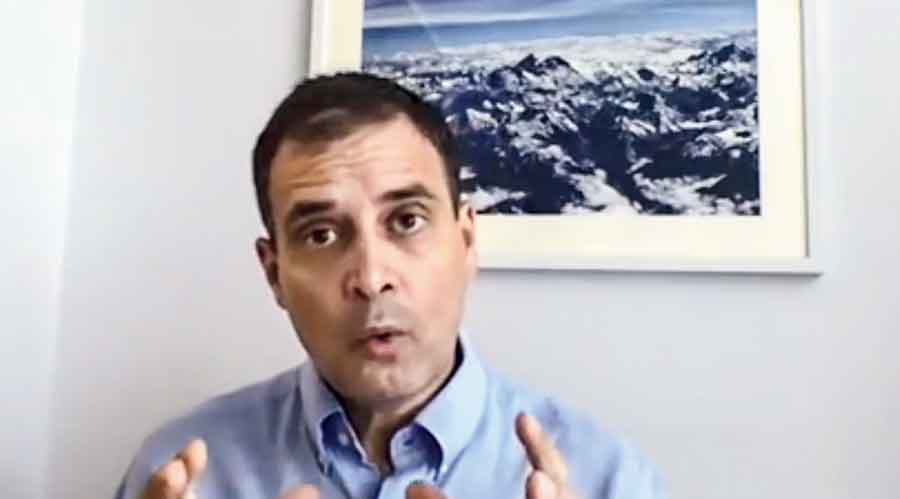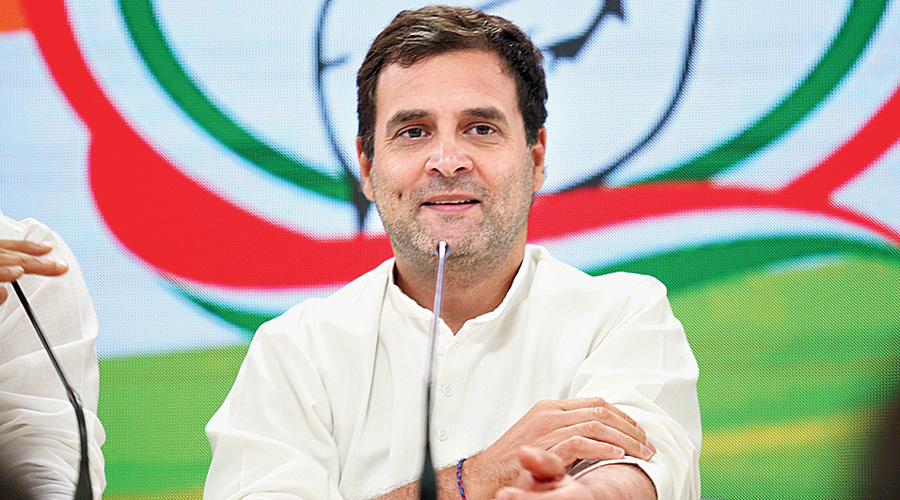Rahul Gandhi on Friday said fearless people who were opposed to the RSS-BJP needed to be inducted into the Congress while those in the party who were scared must be shown the door.
Addressing around 3,000 social media volunteers of the Congress through videoconference, Rahul said: “There are lots of people outside the Congress who are not frightened by the RSS-BJP. They need to be brought into the Congress. And those among us who are scared need to be shown the door. Let them go, we don’t need such people. Go to the RSS, have fun. We need fearless people. That’s our ideology.”
He was explaining the strength of the Congress ideology that had inspired many tall leaders across the world and wondered whether anybody had ever heard of any great personality proclaiming he or she had been inspired by the RSS’s principles.
Rahul recalled what Nelson Mandela had said when he visited the anti-apartheid revolutionary with Sonia Gandhi and Priyanka Gandhi Vadra: “We developed the confidence that we can fight because the Congress fought the British with truth and non-violence.”
Rahul asked if the world had ever discussed RSS leaders M.S. Golwalkar and V.D. Savarkar.
The Congress MP conceded it might be a long battle but asserted that the party was prepared to do whatever was required to save the country.
He also named former confidante Jyotiraditya Scindia while responding to a question about the people who were quitting the Congress. Insisting that fear was the primary factor, he said: “Scindiaji dar gaye (Scindia got scared). What will happen to my palace, my money… he went. He joined the RSS. We need people who are willing to fight the RSS, not surrender to the RSS.”
Although the interaction was not open to the media, those who attended the session said Rahul stressed how crucial social media was at a time when the mainstream media was “frightened” and not doing its duty. He said that while the Narendra Modi government had managed to suppress the voice of the mainstream media, it was not easy to control social media, which was bringing out the truth.
Rahul and his close associates suspect that many Congress leaders are scared of possible vindictive actions by the Modi government and so refuse to go beyond a point in attacking them.
One of the causes for the perceived distrust between entrenched senior leaders and the younger lot was the suspicion that the veterans were “compromised”. This perception received a jolt when young leaders supposed to be close to Rahul — Scindia and Jitin Prasada — crossed over to the BJP.
Scindia didn’t only defect, he pulled down the Kamal Nath government in Madhya Pradesh and installed the BJP, which had been rejected by the people in the elections.
Rahul had in his letter announcing his resignation from the Congress president’s post in 2019 hinted at lack of support from senior leaders, arguing that he often felt he was fighting alone.
Many senior leaders were not on the same page with him on his single-minded attack on Modi over the Rafale deal. Many veterans don’t appreciate his blunt attacks on industrialists Mukesh Ambani and Gautam Adani, arguing that a centrist party like the Congress needed to have an understanding with the corporate.
Some of these leaders also believe that the exodus from the Congress is because of a drift in the party, not the “fear” Rahul has been talking about.
But it is true that many Congress leaders in Gujarat and Maharashtra defected to the BJP after they were allegedly hounded by central agencies. Notable defections in Bengal and Assam were also triggered by purported abnormal pressure exerted on them by investigative agencies.
Even the Samajwadi Party and the Bahujan Samaj Party of Uttar Pradesh were accused of being subdued because of pressure from the central government. Major defections from the Telugu Desam Party in Andhra Pradesh that bolstered the BJP’s strength in the Rajya Sabha also came amidst speculation on similar coercion.












